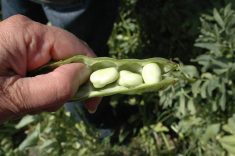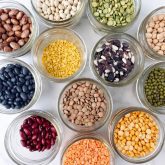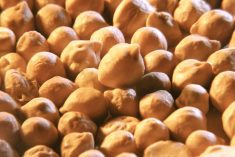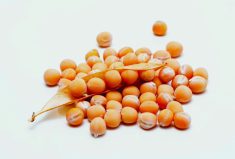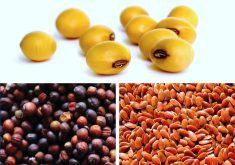It’s being hailed as a game changer — a new high-protein yellow pea variety tailor-made for the booming plant protein market.
And producers in Alberta won’t have long to wait before they can get their hands on both the new variety and, possibly, premium prices.
“I think it’s fantastic news to hear that there’s investment in field pea breeding and having a processor set up in Alberta,” said Mark Olson, the former pulse unit head with the province’s Ag Department.
“It’s something I’ve been talking about — and dreaming about — for probably 20 years now.”
Pulse champion Allison Ammeter is just as excited.

“I’ve been banging the drum for a while that the wave of the future is a lot more specialized contracts,” said the Sylvan Lake farmer who is an Alberta Pulse Growers director and past chair of that organization and Pulse Canada.
“I see it always as a win for producers when we are growing for a market that is looking for what we’re growing and giving us guidance on what they want.
“We do it with malt barley. We do it with canola. We do it with wheat. So why would we not do it with yellow peas?”
It’s something that plant protein processors would also welcome. The market just for yellow pea protein is rising at more than six per cent annually, meaning it will nearly double to US$1.5 billion during this decade, according to a report last year from Dubai-based market analyst Future Market Insights.
Read Also

Farming Smarter receives financial boost from Alberta government for potato research
Farming Smarter near Lethbridge got a boost to its research equipment, thanks to the Alberta government’s increase in funding for research associations.
The new variety coming to Alberta was developed by Israeli seed breeder Equinom, which worked with Lovingly Made, the ingredient-manufacturing arm of U.K.-based Meatless Farm, which recently opened a 33,000-square-foot processing facility in Calgary.
“We’re hoping to contract out some fields next year,” said Chris Shields, the division’s president and general manager.
“Right now, our sourcing is across Alberta and Saskatchewan, but we have a disconnect. We buy what would be readily available off the shelf, but we want to be contracting that directly so that we have that relationship with the farmer.
“We want to avoid it being just a standard commodity that they produce and we do something with afterward.”
‘An amazing pea’
Equinom, which says it uses AI technology to find desired traits and to cut the breeding timeline almost in half, has produced a variety that has 30 per cent more protein. It will ultimately be processed by Lovingly Made and used in Meatless Farm’s faux meat products.
“We’re just going through a testing program right now, and all of the results look really promising so far,” said Shields. “Next year, we’ll be doing a scaled-up test with a few hundred tonnes of material. Once we’ve proved it on a larger scale, we’d be rolling out to longer-term contracts. That would be for the 2024 growing season.”

That’s welcome news to yellow pea growers in the province, who have seen their acreage drop by 13.5 per cent in the last year.
The new variety is “an amazing pea,” said Ammeter.
“With our varieties, we’ve made a lot of improvement in terms of how well they stand and how resistant they are to certain issues, but really, our protein levels have been stagnant or decreasing over the last few years,” she said.
“All of a sudden, we’ve got one coming in that is literally a third better protein? That’s amazing. I can’t wait to be able to grow a high-protein pea.”
The arrival of the new variety comes at a time when pulse breeding in Canada has been on a downward slope.
“It’s always great news to hear of new entrants into any market, especially when it comes to breeding,” said Olson.
Depending on how the genetics shake out, pea producers in the province are likely to be excited about the prospect of growing a higher-protein variety — especially one that doesn’t sacrifice yield.
“There’s a trade-off genetically between high protein and high yield, so when you select for high protein, you’re actually selecting against high yield,” said Olson, who is now consulting in the pulse industry (including for Lovingly Made).
“So a lot of the high-protein varieties that are out there will not yield as high as the conventional types. But my understanding of Equinom’s genetics is that it figured out a breeding system where it can maintain both high yield and high protein. That’s where the excitement comes from.”
For Lovingly Made, which produces products with between 65 per cent and 80 per cent protein content, the higher-protein varieties are better for their environmental footprint.
“It’s about six or seven points higher in protein than a typical yellow pea variety that you would see in North America, so if we have a higher-protein variety, we need a little less of it,” said Shields.
The next step in the breeding process will be to improve the amino acid profile to create a more complete protein in their products, as well as improving the taste to remove some of that strong pea flavour that happens with dry processed peas.
“This was a good test of concept, and then it’s going to be on to flavour and amino acid balance,” said Shields.
“Then when the product gets to someone like the Meatless Farm, they don’t have to put in a rice protein to balance the amino acids or add a natural flavour to enhance the taste. We can just do that with what goes in the ground in the first place.”
Equinom has been working on the high-protein varieties for a number of years, so the ones that are set to launch next year are in the later stages of their development, he added.
“Once we’ve proved that concept, we’ll go into a longer seed-breeding program for the amino acids and the taste profiles,” said Shields.
“This is a long-term project for us. We typically take a five- to 10-year look out at where we want to be.”

‘An attractive contract’
But at every stage of the process, Lovingly Made will be working with pea growers in Alberta and other Prairie provinces to produce these crops, he said.
“The most important part of this for us is the farmer,” said Shields, adding his company will be working on “an attractive contract with a longer-term partnership” this year.
“We want to actually work with a farmer and understand the challenges they face. Having those discussions is really key for us before we take the next steps.
“There’s a lot that needs to be done at the farm level to make sure we all get good food, particularly after a year like this one. If we can contract and have a bit more protection, I think that works really well.”
And provincial growers are likely to jump at the chance to produce their yellow peas under contract, especially if they’re receiving a premium.
“Farming is a business first and foremost, so it’s really about net return per acre,” said Olson. “If the demand is there for the crop and the price reflects that, farmers will grow it.”
Ammeter agrees.
“What I want is more dollars per bushel for my peas, and if Lovingly Made pays more, most people will say, ‘Sign me up,’” she said.
“I think most producers would tell you it’s all about the dollars per tonne. And I do believe the more local we get, the more dollars per tonne we get.”
That is, in part, due to lower transportation costs to get the peas from the farm to the processor, she added.
“When we’re quoted a price, they don’t say, ‘OK, here’s how much it’s going to cost to send it to China.’ They factor that all in and give us a per-tonne price,” said Ammeter.
“But you know the per-tonne price has to be higher when the transportation cost is lower. If we’re shipping directly to a plant within 100 miles, that shaves off a lot of transportation costs, and that is always good for a producer.”
Farmers will also be less at risk of market disruptions resulting from trade disputes or non-tariff trade barriers, Olson added.
“It’s a fantastic opportunity in Western Canada to have this processing of these products near the source,” he said. “The more that can be utilized locally, the better, in my mind. It brings stability to the market for sure.”
It also means more money will stay in Alberta — and especially in Alberta pea growers’ pockets, which is “nothing but good” as far as Ammeter is concerned.
“I see it as winning all around,” she said. “I do not see a downside for anyone except perhaps a country that was hoping to buy our product at the lowest possible price. They’re going to have to fight to get some of that now, and I’m OK with that.
“I’m OK with giving an advantage to our Alberta businesses. Personally I prefer that Alberta and Canada see the benefits — the value add, the growth of the economy, the jobs. I want to be able to buy products that I know were not only grown in Alberta but also processed in Alberta.”



